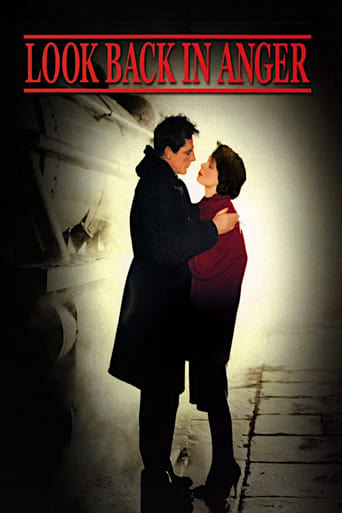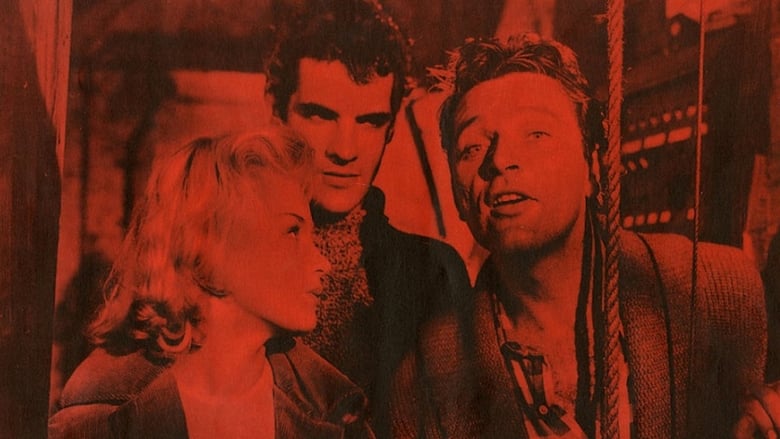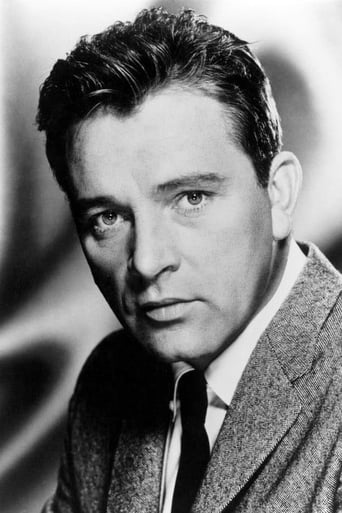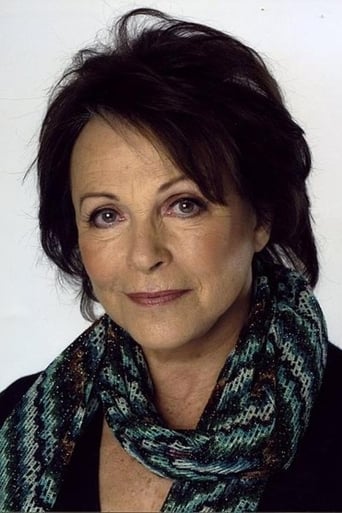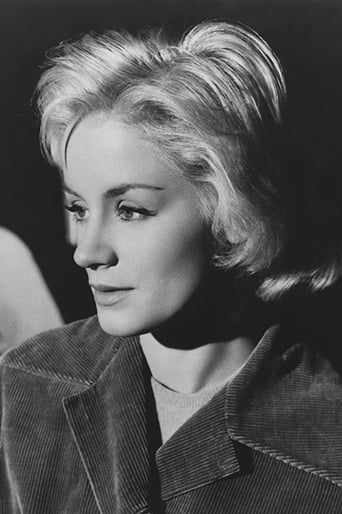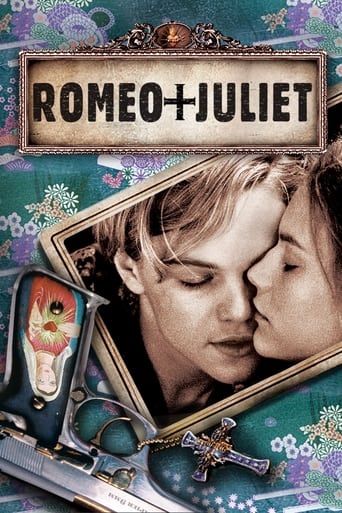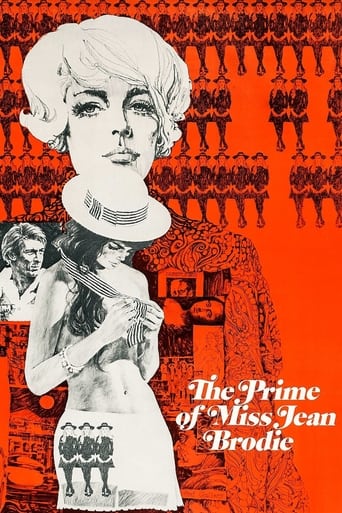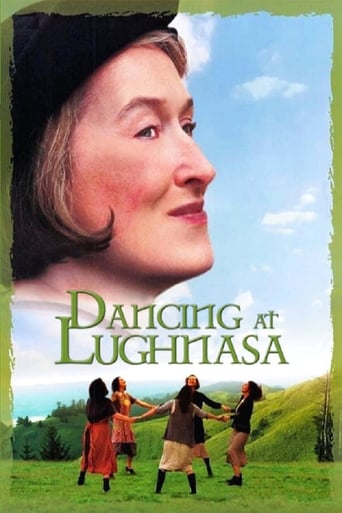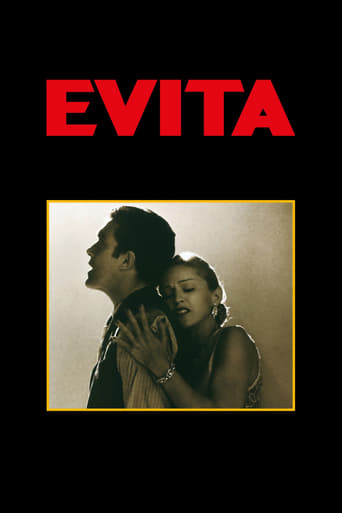Look Back in Anger (1959)
A disillusioned, angry university graduate comes to terms with his grudge against middle-class life and values.
Watch Trailer
Free Trial Channels
Cast


Similar titles
Reviews
That was an excellent one.
A movie that not only functions as a solid scarefest but a razor-sharp satire.
I enjoyed watching this film and would recommend other to give it a try , (as I am) but this movie, although enjoyable to watch due to the better than average acting fails to add anything new to its storyline that is all too familiar to these types of movies.
The movie turns out to be a little better than the average. Starting from a romantic formula often seen in the cinema, it ends in the most predictable (and somewhat bland) way.
Supposedly a sensation in its time - and you can see why. There is an intensity in the portrayal of human relationships that is rarely seen in films from that era.However, this sensationalist aspect has ebbed away from the film over time. What you are left with is a film which, at times, is elegantly shot with beautifully written lines, but which is also very difficult to engage with, or even tolerate, in 2018.The main issue is the central character, Jimmy, played by Richard Burton. He is fundamentally unlikeable. More than that, he is a bully and a boor and an exploiter of women. Yet we are supposed to see him as some kind of hero (or perhaps anti-hero), when really he deserves none of the attention his friends and lovers give him.His instant seduction of another woman moments after his wife (belatedly) walks out on him is frankly preposterous. At release, it may have been seen as scandalous, but not now.The only element of decency he shows is where he defends an immigrant market trader, and that is one of the few scenes in the film that actually works.One for historical reference rather than modern enjoyment.
"Kitchen Sink" drama was in its ascendancy when this film adaptation of John Osborne's play was transferred to the screen in 1959.Philosophically, it's very much in keeping with the conventional, (and by now extremely predictable) views of the counterculture, then viewed through the prism of "the beats" but ten years after through the prism of the hippies.Thus, we have Richard Burton, playing a young man, (a role for which he is already far too old as he looks very middle aged here) who has chosen to eke out an existence as a street vendor of penny candy by day.By night, he is an amateur musician and misanthrope, drowning in an ocean of self pity which he assuages with alcohol and wife beating.His apartment is regulation 1959 degradation model A-1, with girlie pin ups for art, the ironing board in the middle of the room, last weeks newspapers piled everywhere, and walls as pock marked as his un-pancaked oily complexion.Oh, and he has a wife, a platinum blonde, whom he slaps around, and who, discovers she is expecting in one of the film's climactic revelations.But pending fatherhood is no reason to remain faithful, and, thus, when his wife, unable to tolerate more abuse, returns to her parental home, he takes up with a visiting actress.That the actress is played by the exquisitely cultivated and beauteous Claire Bloom strains credibility to the breaking point, (why would she put up with such as this?).And it is to Miss Bloom that he directs some of Osborne's more pungent counter cultural observations--blaming those bloody Edwardians with their Rupert Brooke notions of honor, duty, propriety and respectability who mucked up everything--got it all wrong--it's more honest to live in a flea bitten flop-house and play amateur trumpet by night.Then there's his free love advocacy:, "you can't be both a saint and live--you have to choose one or the other." Did you hear that St. Thomas More? This achingly relevant study of a man in extended childhood, though technically well executed, is as tedious and false as its underlying and very bankrupt philosophy.
John O'Hara, one of the finest American writers of the 20th century, said when discussing writing that if you get the small things right you'll get the big things right ... Having opted to 'open out' John Osborne's one-set, four character play, director Tony Richardson, opens in a Jazz club where Jimmy Porter is sitting in on trumpet with Chris Barber's band _ I can't in all honesty use the word 'jazz' and Chris Barber in the same sentence. So far, so good; in the original play Jimmy Porter is heard several times playing a trumpet off-stage and his wife, Alison, mentions to Helena Charles at one stage that Jimmy had once had his own jazz band. Trouble is that Chris Barber played 'trad' or traditional New Orleans-style jazz and when we follow Jimmy to his bed-sit the posters on his wall feature Gerry Mulligan and the Modern Jazz Quarter, both at the opposite end of the spectrum to Barber, indeed the trumpet player with Mulligan's Quarter was super-cool Chet Baker so right away Richardson has undermined Porter's character. He's also slashed the play's opening scene which was brilliant theatre and presented economically all the key points of the play. Against that is Burton's outstanding performance outshone only by that of Edith Evans who is equally effective UNDERplaying in the two scenes she has as Burton is by overplaying. By coincidence the NFT also screened a 1976 television revival of the play (exactly as written) in the same month which allows for comparing and contrasting. Merely by having Burton in it the film comes out on top but writing-wise the play triumphs.
In 1956 John Osborne stood the British theatre world on it's ear with his rage filled play Look Back in Anger. The Empire was backpedaling, and Osborne's play was a loud broadside to the establishment and the genteel upper crust drawing room plays that dominated the London stage. It was the opening salvo of British generational discontent that would go beyond the stage to film and music and create a social revolution. In England the era of question authority had arrived.Jazz loving, university educated Jimmy Porter seethes with anger over everything around him. Living in a cold water flat with his wife Alison (Mary Ure) and friend Cliff he goes into rages at the drop of the hat lashing out cruelly at the housemates. In one instance he viciously tears into Alison wishing she would have a child and that once bonded to her hoped it would die. When Helena (Claire Bloom) , a school friend of Alison comes to visit she is treated in the same fashion. A pregnant Alison decides to leave as does Cliff and Porter takes up with Helena, his angry young man persona toned down slightly but only for the moment.Look Back in Anger echoed a real sense of urgency for it's day. Osborne's Porter speaks for a generation and class that was invisible and powerless at the time. Anger revels in the sun setting on the Empire and those who created it. The open air push cart market that Porter works in serves as a symbolic battle field where corrupt authorities act like martinets and practice veiled racism. Half a century later though this iconoclastic work has lost a large amount of its controversial steam.As Porter, Richard Burton seethes from start to finish. Every word he utters cuts. Burton's magnificent voice gives powerful expression to Osborne's words but his overall performance is one over the top non-stop ugly whine. There are only tid bits of humor and joy in his character that moves from one rage to the next. This gets tired fast since Porter is unable to channel his anger to change good or bad. It is just one long hissy fit. As lovers and targets Mary Ure and Claire Bloom stand around looking shell shocked most of the time. Their performances are lifeless as they endure tirade after tirade from Jimmy with battered understanding. By film's end there is no character left to respect or performance to admire. It's like listening to your neighbors argue for two hours.Anger was the "kitchen sink drama" archetype but is clearly inferior to most similar films that followed such as Saturday Night and Sunday Morning, The Loneliness of the Long Distance Runner, The Sporting Life and The Entertainer, which Osborne also wrote and had the same director (Tony Richardson). In those works the characters had more dimension than the howling Burton and his comatose victims and a basic theatrical understanding of comedy relief which in Look Back in Anger goes down the drain fast.

